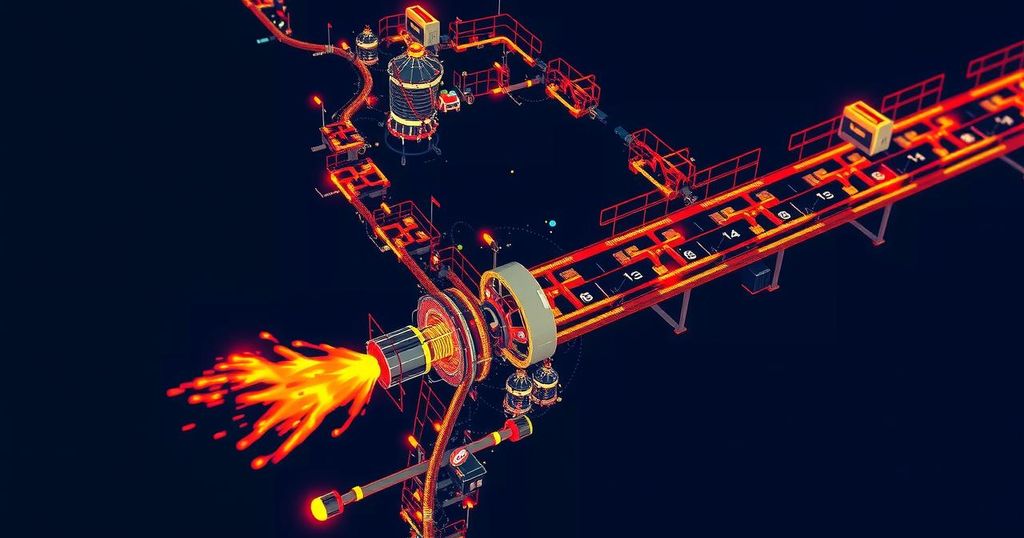Brazil and Argentina Collaborate with Bolivia for Vaca Muerta Gas Transport

Brazil’s Grupo Matrix Energia and Argentina’s TotalEnergies have formed a partnership with Bolivia’s YPFB to transport natural gas from Argentina’s Vaca Muerta shale formation. The agreement focuses on utilizing Bolivia’s existing transport network and aims at improving regional energy integration, amidst Argentina’s ambition to become a significant gas exporter while addressing ongoing infrastructure challenges.
Brazil’s Grupo Matrix Energia and Argentina’s TotalEnergies have entered into an agreement with YPFB, Bolivia’s state energy company, to facilitate the transportation of natural gas sourced from Argentina’s Vaca Muerta shale formation. The deal, signed on November 22, aims to navigate the evolving supply dynamics in the region by leveraging Bolivia’s existing gas transportation infrastructure. This partnership is essential in ensuring that Argentine gas supplies can be efficiently delivered to Brazilian consumers, thus fostering regional energy integration.
YPFB highlighted that Bolivia has experienced a decline in gas exports, prompting Argentina and Brazil to seek alternative supply avenues. With Argentina possessing the second-largest shale gas reserves globally, it is positioning itself as a burgeoning gas exporter. Despite this potential, the development of a comprehensive pipeline network and a functional framework for tariff negotiations remain ongoing. The agreement will enable YPFB’s transportation subsidiaries to oversee the movement of natural gas through their expansive 1,000 km pipeline, connecting Argentina to Brazil.
In addition to the transport agreement, TotalEnergies and Grupo Matrix Energia have finalized a purchase and sales contract. Furthermore, YPFB confirmed that TotalEnergies has secured two key permits to export natural gas from both the Austral and Neuquen Basins to Brazil. On a related note, YPF is reportedly consolidating its liquefied natural gas (LNG) project with intentions to enhance production and exports from Vaca Muerta, thereby strengthening Argentina’s foothold in the global LNG marketplace.
YPF aims to acquire $2 billion (2.02 trillion pesos) to fund the Vaca Muerta Sur pipeline project by the second quarter of 2025, which is expected to transport an additional 390,000 barrels of oil per day from the Vaca Muerta formation to a coastal export facility in Rio Negro province, Argentina, under the management of the Vaca Muerta Oil Sur company, which is controlled by YPF.
The recent partnership involving Grupo Matrix Energia from Brazil, TotalEnergies of Argentina, and Bolivia’s YPFB signifies a strategic maneuver in the complex landscape of South American energy supply and transportation. Bolivia’s transport infrastructure is to be utilized for transporting natural gas from Argentina’s Vaca Muerta, marking a collaboration aimed at improving regional energy security amid shifting supply dynamics. Argentina’s efforts to become a key gas exporter leverage its substantial shale reserves, yet the need for better pipeline networks and tariff frameworks signals ongoing challenges in infrastructure development.
In conclusion, the collaborative agreement between Brazil, Argentina, and Bolivia marks a significant progression in regional energy integration, while addressing the fluctuations in gas supply dynamics. Argentina’s ambitions to emerge as a major gas exporter hinge on successful infrastructure development, as exemplified by the ongoing efforts in the Vaca Muerta region. The engagement of YPFB in facilitating gas transport through its pipeline network underscores the importance of cross-border partnerships in enhancing energy security in South America.
Original Source: www.offshore-technology.com








